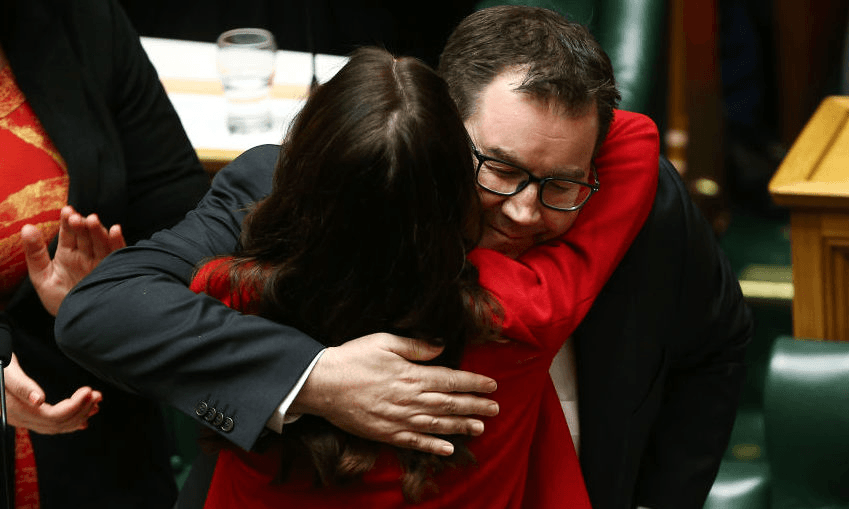Labour’s debut wellbeing budget is a solid jump to the social spending left but could hardly be described as transformational, writes Maria Slade in Wellington.
With its wood panelling and forest green décor parliament’s neo-classical 1920s debating chamber has a surprisingly inviting feel.
Normally a humble business reporter based on Auckland’s CBD fringe, I felt like a tourist in my own country attending the Beehive budget lockup yesterday and creeping into the public gallery to watch the man himself, Grant Robertson, proudly deliver his first wellbeing budget.
Jacinda Ardern, wearing a scarlet-red jacket for the occasion, embraced her minister of finance. Government MPs clapped on cue and passed round sweets. Job done, Robertson left the chamber as National leader Simon Bridges leapt to his feet and thundered that this was the “botched budget” following the leak-that-wasn’t-a-leak saga. Open democracy in action is an impressive sight.
Labour delivered some bold initiatives as it attempted to put its money where its mouth is and make good on its promise to put the wellbeing of New Zealanders at the core of its spending. A $1.9 billion package for mental health services. Another $1.1b to help vulnerable children. A $535m spend on indexing main benefits to wage increases and implementing other measures in line with the Welfare Expert Advisory Group’s recommendations. It’s hard to argue that this expenditure isn’t sorely needed.
Even the business groups didn’t hate it. “The Wellbeing Budget contains spending that would be positive for business and the economy,” BusinessNZ said primly.
The business wallahs particularly liked the $300m to plug New Zealand’s gaping hole in investment which sees promising Kiwi businesses forced overseas because they can’t find funding here.
This commitment to the risky business of venture capital is a courageous move to boost New Zealand’s innovation economy. While the $2m to $15m “valley of death” funding gap is a universally acknowledged and persistent problem for expanding firms, the fact remains some will fail or go overseas anyway with the inevitable hand-wringing over taxpayers’ money being wasted or supporting ventures that are now owned by Silicon Valley zillionaires.
Property sector bodies were disappointed there was nothing to bolster housing supply for middle New Zealand or further encourage healthier home standards. Given the headache that is KiwiBuild it is hardly surprising the government has steered away from the issue of housing this time around.
Industry groups were receptive to the news that the government will establish New Zealand’s first ever long-term infrastructure plan, however. This will be a 30-year strategy for the country’s infrastructure needs giving businesses more certainty about upcoming projects.
They were also keen on training initiatives such as the reallocation of $197m from the unspent fees free policy into vocational education, because while all this spending on infrastructure and new mental health services is great news it will require more skilled workers in the midst of an existing skills shortage. It is not entirely clear where all these additional talented and trained up people are supposed to come from.
After Labour’s embarrassing backdown over a capital gains tax the budget was all but silent on tax matters. Tax is the elephant in the room. If the government wants to continue down the wellbeing route it has to be able to pay for it. It’s in the ballpark this year with an expected surplus of $3.5b and new spending of $3.8b, but at some stage New Zealand will be forced to face the fact that a large proportion of our revenue comes from taxing salaries and wages. With an ageing population and slowing immigration we will run out of income to tax and some form of wealth tax will be inevitable. “
The personal taxation goose continues to be plucked pretty hard,” as Deloitte chief executive Thomas Pippos put it. But that debate is clearly for another budget day.
At this point in the wellbeing game the government’s new initiatives are a small fraction of the $400 billion it will spend over the next four years. The vast bulk of government expenditure goes on business-as-usual bills like pension payments and healthcare. Robertson has said eventually it plans to put this kind of spending under the wellbeing microscope as well, but Rome wasn’t built in a day.
Nonetheless you’d hope the Romans achieved a metre or two of roading in a 24-hour period. The Council of Trade Unions calls Labour’s debut wellbeing budget “the first step towards a people-focused future”, and that’s probably fair. It’s a solid jump to the social spending left and a well-meaning start, but it could hardly be described as transformational.
All of The Spinoff’s coverage of Budget 2019 is made possible thanks to the support of Grant Thornton. Learn more about our partnerships here.


